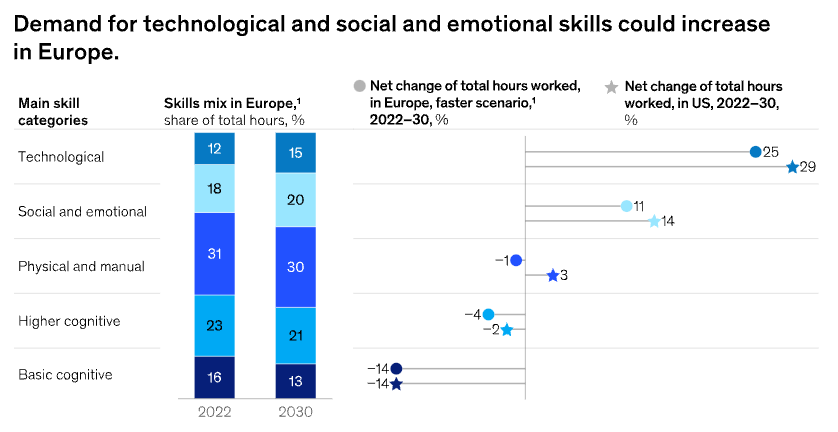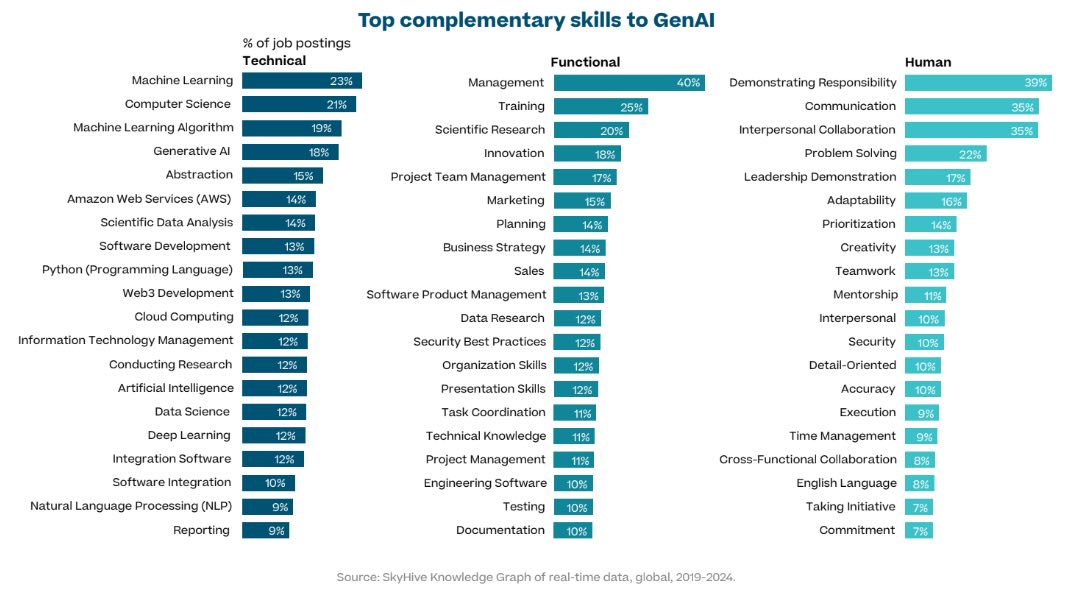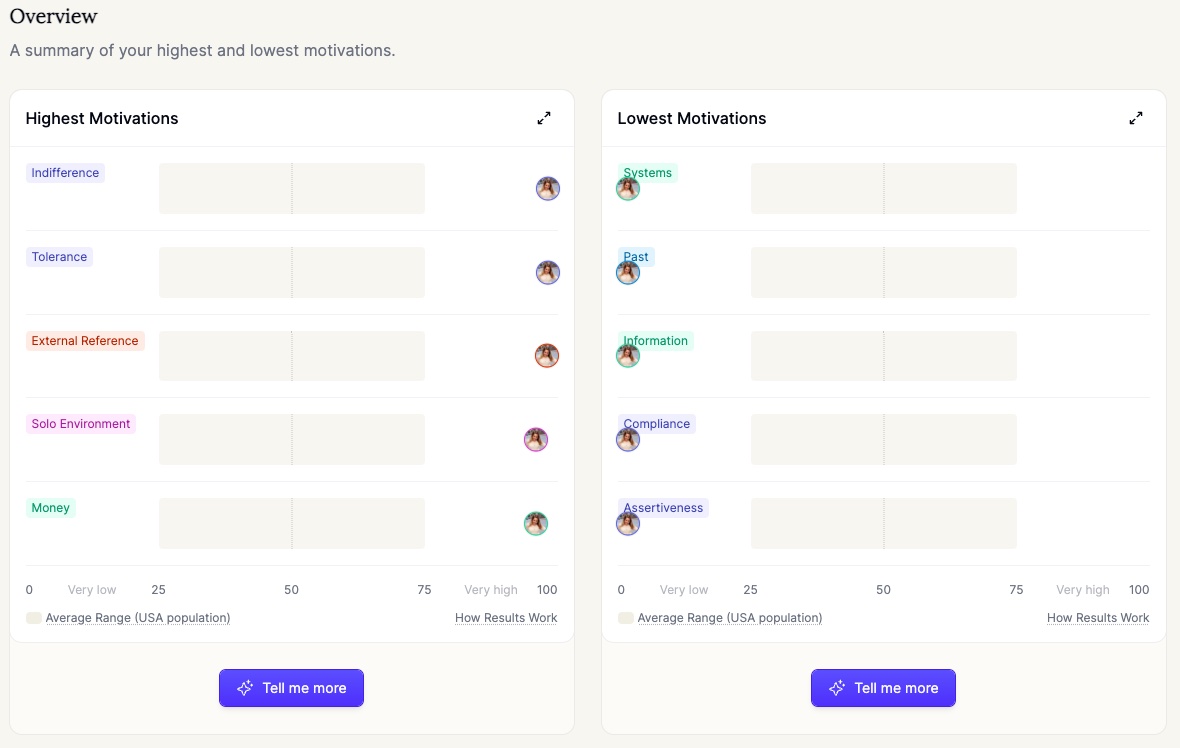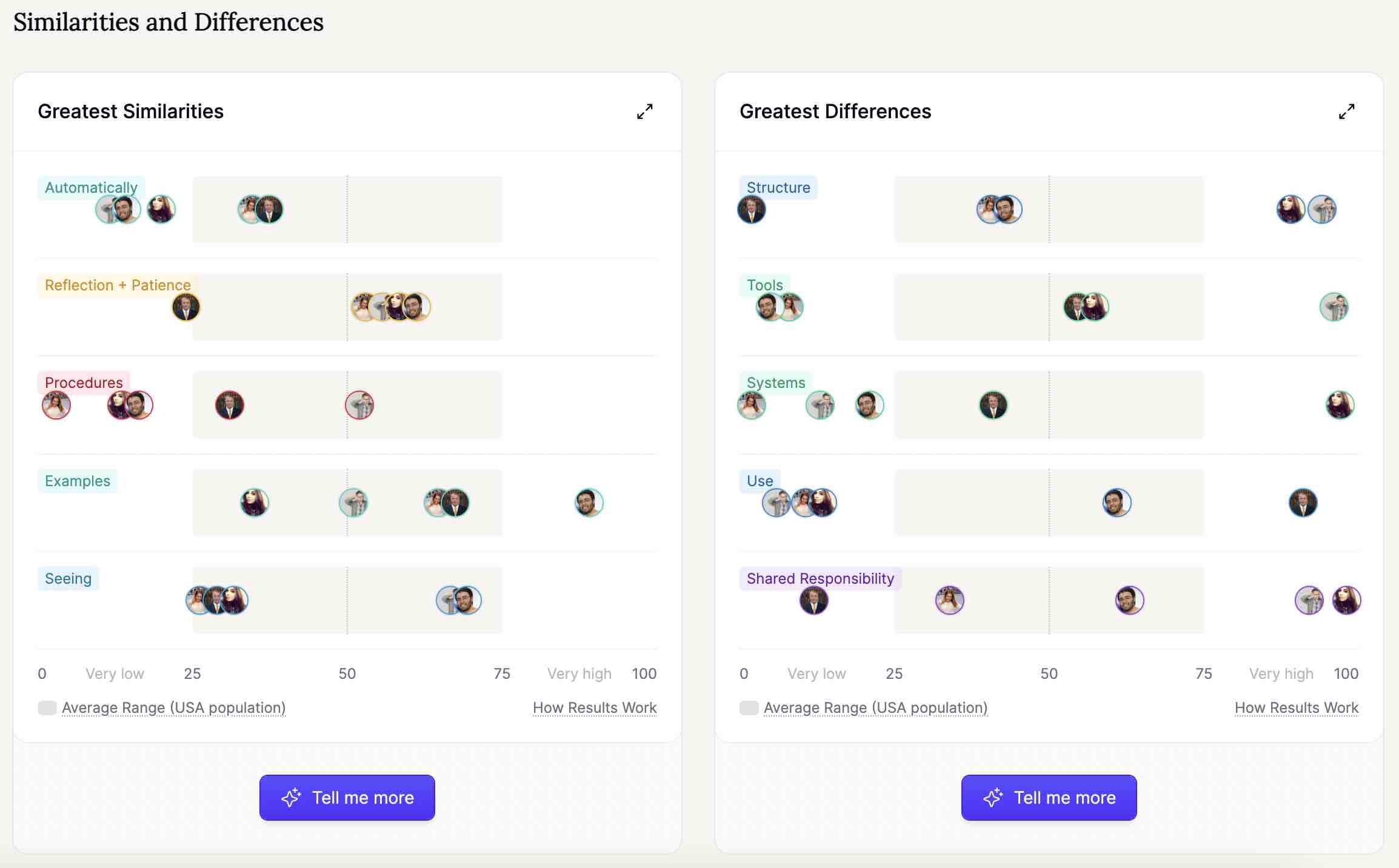Hard skills vs soft skills: Let's discover the difference 🤝
Want to know the real difference between hard and soft skills? Data shows that while technical expertise opens doors, it's mastering specific human skills that truly drives business success. Let's discover which skills actually matter.
- Author
Aleney de Winter

What is the difference between hard vs soft skills?
Hard skills refer to quantifiable technical or job-related knowledge and expertise. They are teachable abilities often acquired through formal education, training programs, or practical experience.
Soft skills, also known as human skills or people skills, encompass a more nuanced set of qualities. They relate to how you communicate, navigate social situations, make decisions, and solve problems. Here's something fascinating about measuring soft skills: while traditional methods rely on subjective observations and feedback, the landscape is evolving.
Organizations have typically used personality tests that put people in boxes—but let's be honest, humans are way more complex than that! Through groundbreaking technology, we can now measure 48 distinct soft skills with precision, helping us understand the unique blend of human abilities that make each person extraordinary in their own way.
Hard skills and soft skills are both valuable and essential in today's work environment. Both contribute to a well-rounded professional. However, our research predicting venture outcomes has revealed something fascinating—it's human skills that ultimately determine business performance.
What are hard skills?
Think of hard skills as your technical toolkit—they're the specific, measurable abilities you've picked up through learning and doing. Whether it's mastering Excel formulas, coding in Python, or perfecting your graphic design techniques, these are skills you can clearly demonstrate and measure. The beautiful thing about hard skills? There's usually a clear path to developing them, whether through courses, training, or hands-on practice. And when you've got them, you can prove it!
Some examples of hard skills include:
- Data Mining: Extracting insights from datasets using data mining tools and techniques.
- Data Management: The ability to organize, store, and maintain data, ensuring its integrity.
- Statistical Analysis: Competence in analyzing and interpreting data for informed decision-making.
- Coding and Programming: Understanding programming languages like Python, Perl, Java, C++, or JavaScript. Plus, the ability to write, test, and debug code.
- Design: Utilizing graphic design software like Adobe Suite to create visual content.
- Language Proficiency: Fluency in a foreign language. This is often demonstrated through language exams or certifications.
- Mobile Development: Skills in designing, developing, and maintaining mobile applications.
- User Interface Design: Expertise in creating interfaces for software applications and websites.
- Storage Systems and Management: Knowledge of storage technologies and managing data storage.
- Network Security: Safeguarding networks and data from cyber threats and security breaches.
- Certifications: Certification in areas such as project management, network administration, or accounting.
- Digital Marketing and Management: Online marketing techniques, including SEO services, social media, and email marketing.
- Engineering Skills: Competence in fields such as mechanical, civil or electrical engineering.
- IT and Computer Skills: Working understanding of computer systems, hardware, and software.
- Machine Learning and Artificial Intelligence: Machine learning algorithms, data modeling, and AI technologies.
What are soft skills?
Think of soft skills as your human superpowers—they're the natural abilities that help you connect, influence, and work brilliantly with others. While some call them interpersonal or people skills, they're really about how you navigate relationships and situations. These are the skills that help you read the room, communicate your ideas clearly, and build authentic connections. They tap into your emotional intelligence and social awareness, transforming everyday workplace interactions into opportunities for meaningful impact.
Soft skills examples include:
- Communication: Expressing ideas, thoughts, and information through written, verbal, and non-verbal means such as body language.
- Empathy: Understanding and compassion for the feelings and perspectives of others. Empathy fosters better relationships and teamwork.
- Teamwork: The capacity to work with others. Teamwork requires valuing diverse opinions and contributing to group dynamics.
- Leadership: The skill to guide, motivate, and inspire others to achieve common goals.
- Problem-solving: The skill to analyze complex situations, identify issues, and solve problems through practical solutions.
- Integrity: Upholding ethical principles, honesty, and moral values in all actions and decisions.
- Dependability: Being reliable and consistent. Fulfilling commitments and responsibilities and delivering high-quality work.
- Adaptability: Being flexible, open to change, and able to adjust to new challenges.
- Open-mindedness: Maintaining a willingness to consider different perspectives and adapt to changing circumstances.
- Creativity: Demonstrating the ability to generate new ideas, solutions, and approaches to problems.
- Critical thinking: The skill to analyze information, assess situations, and make well-informed decisions.
- Organization: Managing tasks, time, and resources to enhance efficiency and productivity.
- Willingness to learn: Maintaining a proactive attitude toward acquiring new knowledge and skills.
- Time management: Managing one's time and priorities to enhance productivity and meet deadlines.
- Active listening: Engaging in and comprehending conversations with respect.
- Conflict resolution: The capability to address and resolve conflicts and maintain harmony.
- Stress management: Coping with stress, pressure, and adversity in a healthy, productive manner.
Why is it important to have both hard and soft skills?
Think of hard and soft skills as the perfect partnership in your professional journey. Let me show you why you need both to truly thrive at work.
Your hard skills are like your professional toolkit—they're the technical expertise that helps you excel at specific tasks. Whether you're a surgeon performing operations or a designer creating websites, these skills form the foundation of your work. They're often what gets you through the door and help you deliver quality results.
But here's where it gets interesting: while hard skills might land you the job, it's your human skills that often determine how far you'll go. Our research shows that professionals who combine technical expertise with strong human skills consistently outperform their peers. These skills shape every aspect of your work relationships and success:
- Communication and collaboration that create workplace harmony
- Conflict resolution that turns challenges into opportunities
- Adaptability that helps you navigate change with confidence
- Active listening and empathy that strengthen workplace relationships
- Decision-making abilities
- Leadership qualities that inspire and motivate others and guide team dynamics
Let's look at a surgeon, for example. Technical precision in the operating room is crucial—but what sets exceptional surgeons apart? It's their ability to communicate clearly with patients, collaborate seamlessly with their team, and stay calm under pressure.
In today's skills-based organizations, success stories often share a common thread: professionals who blend technical mastery with human connection. Whether you're:
- Leading a team through a challenging project
- Building relationships with teammates or clients
- Making decisions based on gut instinct under pressure
Your technical expertise gets the job done, but your human skills determine how effectively you do it.
The beautiful thing about combining these skills? You become more than just technically competent—you become truly impactful. You're not just delivering results; you're building relationships, inspiring teams, and creating lasting value for your organization.
What is the difference between soft and hard skills?
How they're developed
Hard skills come from structured learning—think formal education, specific training programs, and dedicated courses. It's like learning to use a new software platform—there's a clear path from beginner to expert.
Soft skills grow through life experiences, thoughtful coaching, and real-world interactions. They're shaped by how we navigate relationships and challenges over time, like developing your leadership style or becoming a better team player.
How they're measured
Hard skills are straightforward to assess—you can test them, certify them, and measure improvements clearly.
Here's something fascinating about soft skills: while they were traditionally seen as subjective, we can now measure them scientifically. Using advanced tools like Marlee's Motivational Analysis and answering questions about what motivates you, we can pinpoint performance gaps and develop specific human skills with precision.
👉 How to take the Marlee Motivational Analysis
How transferable are they between industries and roles
Hard skills often tie closely to specific industries—like a specialized tool that works perfectly for one job but might not fit another.
Soft skills? They're like your personal Swiss Army knife—valuable everywhere. Whether you're leading a tech startup or managing a healthcare team, abilities like clear communication and adaptability always matter.
Adaptability to the Future
Hard skills can expire as technology evolves—yesterday's must-have technical skill might be tomorrow's outdated knowledge.
Soft skills remain evergreen. As automation reshapes work, human abilities like creative thinking, emotional intelligence, and adaptability become even more crucial.
What hard skills and soft skills are employers looking for when hiring?
The hiring landscape is experiencing a fascinating shift. Traditionally, employers have focused on hard skills—those easily spotted qualifications and technical abilities listed on your resume.1 Why? Because they're straightforward to verify and measure. Think certifications, degrees, and years of experience with specific tools or technologies.
But here's what's exciting: forward-thinking organizations are waking up to the power of human skills. While they still value technical expertise, they're increasingly searching for professionals who bring both technical prowess and strong human capabilities to the table. Our research shows that qualities like emotional intelligence, initiation, and effective communication make the difference between good and exceptional hires.

The demand for technological and social and emotional skills in Europe and the US (Source: A New Future of Work)
The rise of soft skills
So just how important will soft skills be in the future? Very! Deloitte Access Economics forecasts that soft skill-intensive occupations will account for two-thirds of all jobs by 2030.2
Let me share something fascinating: when McKinsey surveyed over 18,000 business executives across 15 countries, they discovered something striking. A whopping 94% of these leaders believe human skills are just as crucial as technical skills for workplace success.3 That's not just a trend—it's a transformation in how we think about professional excellence.
But here's the challenge we're facing: according to the McKinsey report Soft Skills For a Hard World, while organizations are crying out for these human skills, they're surprisingly hard to find. HR professionals are discovering a significant gap between what companies need and what candidates bring to the table.
The Society for Human Resource Management highlighted this disconnect in their research, showing that essential abilities like problem-solving, critical thinking, innovation, creativity, and effective communication are often missing in today's talent pool. 51% of respondents felt education systems weren't addressing the soft skills shortage.4
This skills gap becomes even more critical as automation and AI reshape our workplaces. Think about it: as machines take over routine tasks, what sets humans apart? It's our ability to think creatively, solve complex problems, and build meaningful relationships.5
Here's what this means for your career: while technical expertise remains important, it's the combination of specialized hard skills and well-developed soft skills that will set you apart. In a world where AI can code and robots can build your human skills become your unique advantage.
What soft skills are in demand?
Let me share some eye-opening insights about the human skills that are shaping today's workplace. The data tells a fascinating story about what employers are really looking for.
The World Economic Forum's crystal ball shows us that by 2025, creativity and critical thinking won't just be nice-to-haves—they'll be among the most in-demand skills.6 And LinkedIn's 2023 Global Talent Trends report, which surveyed professionals across 20 countries, revealed something powerful: communication tops the list of most-wanted skills, followed closely by collaboration and problem-solving.7
When global recruitment leader Michael Page asked hiring managers what they're looking for,8 here's what emerged:
- Strong communication abilities (seeing a pattern here?)
- Eagerness to learn and grow
- Natural teamwork capabilities
- Genuine enthusiasm
- Sharp problem-solving skills
But here's where it gets really interesting. The World Economic Forum's Future of Jobs 2023 report9 points to emerging demands for:
- Creative thinking that breaks new ground
- Leadership that inspires and guides
- Social influence that drives change
- Self-efficacy that turns goals into reality
What does this mean for you? Organizations aren't just looking for people who can do the job—they're seeking professionals who can adapt, connect, and innovate. They want people who can navigate complex situations with empathy, build bridges across cultures, and stay resilient when facing challenges.
What hard skills are in demand?
Let's talk about the technical skills that are opening doors in today's job market. Cornerstone's 2024 Global State of the Skills Economy report reveals the impact of technology on skills:

The impact of technological advancements on skills (Source: Global State of the Skills Economy)
LinkedIn published a list of the most in-demand skills, which reveals an interesting picture of what employers are hunting for:
- Software development (the backbone of digital transformation)
- SQL (because data is the new gold)
- Finance (following the money never goes out of style)
- Python (powering everything from AI to analytics)
- Java (still going strong after all these years)
- Data analysis (turning numbers into insights)
- JavaScript (making the web come alive)
- Cloud computing (because everything's moving skyward)
- CRM (keeping customer relationships strong)
Here's what's fascinating: while these skills are in hot demand now, the technology landscape is constantly shifting. The key isn't just mastering these skills—it's developing the ability to learn and adapt as new technologies emerge. Think of these as your technical foundation, ready to be built upon as the digital world evolves.
📖 Read more: Best Tech Jobs: 7 Top Future-Proofed Careers
Here are a few courses to help stay on top in these fields:
- Blockchain: MIT’s Sloan School of Business has a six-week online course.
- Cloud computing: Stanford University offers online courses in cloud management and overall cybersecurity.
- Analytical reasoning: Khan Academy has some robust curriculum plans around developing analytical reasoning.
- AI: Northwestern University has an online program on AI basics and subsequent applications.
- UX design: Rice University has a 24-week online boot camp to learn UX/UI design.
- Business analytics: Boston University has an online program. Wharton Executive Education also offers Data Analytics certification.
- Affiliate marketing: Google and YouTube drive a chunk of the affiliate marketing world. You can learn a lot about affiliate marketing by browsing them. Here’s a starting point.
- Sales: Sales drives revenue in most organizations, and are an essential skill. There are thousands of courses, coaches, and playbooks online to learn sales. LinkedIn Learning has a bunch of sales modules.
- Scientific computing: California Institute of Arts and Technology offers a Code the Future class.
- Video production: MediaTech has an online course in video production. LinkedIn offers a course on video shooting and editing.
When hard and soft skills collide (in the best possible way!)
Think of hard and soft skills as dance partners—they're at their most powerful when working together. This beautiful partnership shines especially bright in roles like data science (where technical expertise meets storytelling), healthcare (where medical knowledge meets patient care), and sales (where product knowledge meets relationship building).
Let me share two fascinating examples of this partnership in action:
Case study 1: Satya Nadella, Microsoft's Transformational CEO Here's a leader who proves technical brilliance and human connection can create magic. While Nadella's deep expertise in cloud computing and software development got him in the door, it's his remarkable emphasis on empathy and inclusive leadership that transformed Microsoft's culture and success. Under his watch, Microsoft isn't just creating technology—it's creating technology that empowers everyone, thanks to his unique blend of technical mastery and human-centered leadership.
Case study 2: Sheryl Sandberg, Meta Platform's Chief Operating Officer (COO) Sandberg brings something special to the table: she combines razor-sharp business acumen with exceptional people skills. While her economics background and operational expertise form her foundation, it's her talent for negotiation and passionate advocacy for women in leadership that truly set her apart. Her ability to build strong partnerships and champion inclusive leadership shows how powerful it is when business savvy meets human understanding.
These leaders show us something remarkable: it's not about choosing between technical expertise and human skills—it's about leveraging both to create extraordinary impact.
Hard skills vs soft skills: Hiring for soft skills
Job seekers: what soft skills to include on resumes
Let me share something that might surprise you: while your technical credentials matter, it's often your human skills that make hiring managers sit up and take notice. Let's make sure your resume showcases both sides of your professional story!
Here's what we know: the most successful candidates don't just list their qualifications—they paint a picture of how their human skills create real impact. Think about times when your emotional intelligence, leadership abilities, or problem-solving skills made a difference. These aren't just nice-to-have extras; they're essential ingredients for workplace success.
When crafting your resume, highlight soft skills that:
- Show how you work with others (collaboration, communication, emotional intelligence)
- Demonstrate your adaptability (change management, resilience, learning agility)
- Showcase your leadership potential (decision-making, conflict resolution, team building)
- Reflect your problem-solving abilities (critical thinking, creativity, innovation)
Remember: specific examples pack more punch than generic lists. Instead of just saying you're a "good communicator," share how your communication skills helped bridge departments or improve client relationships.
A consolidated list of essential soft skills for hiring success includes:
- Creativity
- Collaboration
- Adaptability
- Empathy
- Active listening
- Strong communication
- Emotional intelligence
- Initiative
- Compassion
- Attention to detail
- Problem-solving skills
- Positive attitude
Hiring managers: how to hire candidates with the right soft skills
Let me share a powerful insight from a First Round Review tech CTO summit that might transform how you think about hiring. Here's what they discovered about assessing human skills during interviews:
"Institute roleplays in your interview process," they suggested. "Have candidates work through real scenarios with team members—whether it's discussing technical processes, handling prioritization debates, or giving balanced feedback. Yes, it takes time, but it's far less costly than hiring a leader who doesn't connect with your team."
Think about that last point for a moment. A technically brilliant hire who lacks human skills can unravel an entire team's dynamics. While technical expertise is your baseline (you absolutely need those engineering skills for an engineering manager!), it's the human skills that determine long-term success.
Here's how to evaluate soft skills effectively:
1. Go beyond the 30-minute interview
- Create scenario-based discussions
- Explore how candidates would handle specific situations
- Understand their emotional responses to challenges
- Discover when they're at their best (and worst)
2. Use role-playing effectively
- Test responses to everyday situations (like initiating new projects)
- Explore handling sensitive issues (like customer data security)
- Assess leadership capabilities through realistic scenarios
3. Make data-driven decisions
Here's something exciting: at Marlee, we've developed an evidence-based approach to assessing 48 human skills. Let me share a real-world example of how this works:
Canva, one of the world's fastest-growing tech companies, uses our assessment to make smarter hiring decisions. Their Internal Coaching Lead, Sarah Nanclares, uses Marlee to:
- Benchmark candidates against successful team members
- Evaluate cultural alignment
- Gain deeper insights before interviews
- Make more objective hiring decisions
📖 Read more: Top executive coaching management software tips from Canva
The key takeaway? Using a combination of thoughtful scenarios and data-driven assessments helps you spot the candidates who bring both technical excellence and human expertise to your team.
How to improve both hard and soft skills
10 tips for improving hard skills
- Formal education: Enroll in degree programs, workshops, or courses at an educational institution.
- Online courses and certifications: Leverage online learning platforms to gain specific skills and recognized certifications.
- Practical experience: Gain hands-on experience through internships, apprenticeships, or on-the-job training.
- Self-study: Research and study relevant materials, textbooks, and resources to expand your knowledge.
- Mentorship: Seek guidance and mentorship from experienced professionals in your field.
- Networking: Connect with peers and experts in your industry to exchange knowledge and ideas.
- Workshops and seminars: Take part in industry-specific workshops, seminars, and conferences to stay updated.
- Project work: Engage in real-world projects and assignments to apply and refine your hard skills.
- Collaboration: Collaborate with colleagues to share expertise and learn from one another.
- Continuous learning: Commit to ongoing learning and staying current with industry advancements.
10 tips for improving soft skills
1. Understand your motivations Start with self-awareness! Take the Marlee Motivational Analysis by answering questions on what motivates you to discover your natural strengths and areas for growth. It's like having a personal map of your professional superpowers.

The Marlee "My Results" board
2. Get personalized coaching Our evidence-based online coaching programs target specific skills you want to develop—from big-picture thinking to emotional intelligence. Think of it as having a personal trainer for your professional growth.
3. Master communication Level up your verbal and non-verbal skills through active listening and clear expression. Try resources like Dale Carnegie Training. or Toastmasters International to practice in supportive environments.
4. Develop empathy Work on understanding others by acknowledging their emotions, perspectives, and needs.
5. Navigate conflict like a pro Develop the ability to navigate and resolve conflicts.
6. Embrace adaptability In today's fast-moving workplace, flexibility isn't optional—it's essential. Practice responding positively to change.
7. Build leadership presence Develop your ability to inspire and guide others, whether you're leading a project or a team.
8. Strengthen team dynamics Use Marlee's team tools to understand work styles, identify synergies, and build stronger collaborations. It's like having X-ray vision into team dynamics.
👉 How to run a team dynamics workshop

A Marlee team work space showing similarities and differences in soft skills
👉 How to create a team work space in Marlee
9. Master stress management Develop strategies to stay cool under pressure—essential for long-term success.
10. Manage your time Learn to prioritize effectively and boost productivity without burning out.
The beautiful thing about these skills? They're all learnable. Start with one that resonates most, and watch how it transforms your work relationships and impact.
A soft skills mini-case study: Can you teach empathy?
Let's tackle a fascinating question: Is empathy something you're born with, or can you develop it? Here's what the research tells us—and it's exciting news for anyone looking to grow their human skills.
The Jefferson Scale of Empathy reveals something powerful: empathy isn't just a personality trait you either have or don't. It's actually a cognitive skill you can develop,12 like strengthening a muscle. Think of it as going to the gym for your emotional intelligence.
Here's what's particularly interesting: while recognizing your need for more empathy is a great first step, there's a twist. Research shows that people in leadership positions sometimes find it harder to find empathy in their day-to-day lives.11 (Don't worry—we've got solutions for that!)
Want to build your empathy skills? Here are some practical ways to start:
- Practice active listening: Before responding to colleagues, try restating what they've shared to ensure you truly understand
- Share genuine appreciation: Make a habit of noticing and acknowledging others' contributions
- Seek different perspectives: Challenge yourself to see situations through others' eyes
- Get coached: Work with a leadership coach or mentors who can help you develop these skills systematically
The best part? Every small step you take to strengthen your empathy creates ripples of positive impact across your team and organization.
Key takeaways: Your blueprint for success
Let me share what we've discovered about the powerful partnership between technical expertise and human skills:
🎯 The skill-building journey Technical skills are your foundation—you'll get them through education and training. But your human skills? They grow through every interaction, challenge, and experience you navigate.
🌟 Why both matter Think of it this way: technical skills might land you the job, but human skills help you soar once you're there. Our research shows the most successful professionals aren't just technically brilliant—they're also masterful at connecting, collaborating, and leading.
📈 The shifting landscape Here's something fascinating: employers are increasingly prioritizing human skills. Why? Because in a world where technology keeps evolving, it's our human capabilities that create truly cohesive and innovative workplaces.
🔑 Your career catalyst The secret to sustainable career growth? It's not about choosing between technical expertise and human skills—it's about growing both. This powerful combination helps you:
- Adapt to industry changes with confidence
- Turn challenges into opportunities
- Build meaningful professional relationships
- Create lasting impact in your organization
Remember: in today's workplace, success isn't just about what you know—it's about how you apply that knowledge to make a difference.
⭐ Unlock your full potential! Start for free with Marlee to understand your soft skills and turn them into your career superpower.
Frequently asked questions
How do emerging technologies impact the demand for hard and soft skills in the workforce?
Emerging technologies are increasing the demand for hard skills in areas such as data analysis, programming, and digital proficiency. At the same time, they highlight the importance of soft skills like adaptability, as technology continually reshapes job roles and requirements.
What strategies can individuals employ to continually improve their soft skills throughout their careers?
Individuals can improve soft skills through activities such as coaching, communication workshops, practicing active listening, seeking mentorship, and participating in conflict resolution exercises. Continuous self-reflection and learning are also key.
How are educational institutions adapting their curricula to address the increasing importance of soft skills in today's job market?
In response to corporate sentiment, educational institutions are now beginning to integrate soft skills training into their curricula, offering courses on communication, teamwork, and emotional intelligence. They are also focusing on experiential learning and real-world applications to develop these skills.
What soft skills should I highlight during an interview?
Focus on soft skills that are most relevant to the job. These may include communication, problem-solving, teamwork, adaptability, leadership, empathy, and time management. Provide specific, tangible examples. Use the STAR method (Situation, Task, Action, Result) to structure your responses. Start by describing the situation or task, explain the actions you took, and conclude with the positive result or impact.
How can I demonstrate that I not only possess soft skills but can also apply them in an organization?
Discuss your understanding of the company culture and values with your team leader and explain how your soft skills align with and support those values. Emphasize your willingness to adapt and contribute positively to the organization's dynamics.
References
- Bauer T, 2016, Hiring solutions: Competence is overrated, The Context of Things, https://thecontextofthings.com/2016/08/23/hiring-solutions/
- Deloitte, 2017, Soft skills for business success, Deloitte, https://www.deloitte.com/au/en/services/economics/perspectives/soft-skills-business-success.html
- McKinsey & Company, Soft skills for a hard world, McKinsey Quarterly, https://www.mckinsey.com/featured-insights/future-of-work/five-fifty-soft-skills-for-a-hard-world
- SHRM, 2021, State of the Workplace Study 2021-2022, SHRM.org https://www.shrm.org/hr-today/trends-and-forecasting/research-and-surveys/Documents/SHRM%20State%20of%20the%20Workplace%20report%202021-2022.pdf
- Besanko D, 2017, Robots Are Taking Americans’ Jobs. What Can Be Done? KelloggInsight, https://insight.kellogg.northwestern.edu/article/robots-are-taking-americans-jobs-what-can-be-done
- World Economic Forum, 2020, These are the top 10 job skills of tomorrow – and how long it takes to learn them, World Economic Forum, https://www.weforum.org/agenda/2020/10/top-10-work-skills-of-tomorrow-how-long-it-takes-to-learn-them/
- LinkedIn Talent Solutions, 2023 Global Talent Trends Australia & New Zealand Edition, LinkedIn https://business.linkedin.com/en-au/talent-solutions/global-talent-trends
- Michael Page, The importance of good communication in the workplace, Michael Page, https://www.michaelpage.co.uk/advice/management-advice/development-and-retention/importance-good-communication-workplace
- World Economic Forum, 2023, Future of Jobs 2023: these are the most in-demand skills now- and beyond, World Economic Forum, https://www.weforum.org/agenda/2023/05/future-of-jobs-2023-skills/
- Review, The Best Advice We Overheard at First Round's CTO Unconference, Review, https://firstround.com/review/the-best-advice-we-overheard-at-first-rounds-cto-unconference/
- Schumann K, Zaki J, Dweck C, 2014, Addressing the empathy deficit: Beliefs about the malleability of empathy predict effortful responses when empathy is challenging, APA PsycNet, https://psycnet.apa.org/record/2014-34128-006
- Center for Research in Medical Education & Healthcare, Jefferson Scale of Empathy, Thomas Jefferson University, https://www.jefferson.edu/academics/colleges-schools-institutes/skmc/research/research-medical-education/jefferson-scale-of-empathy.html


